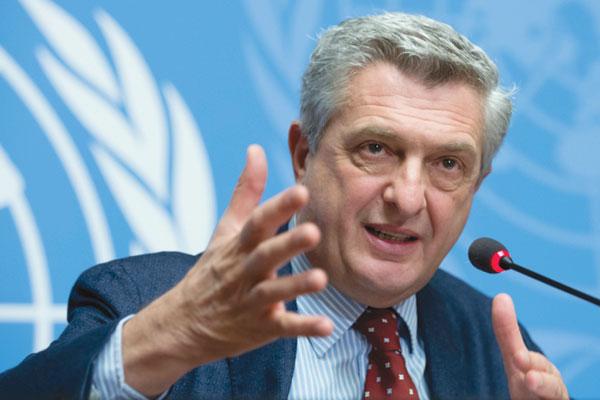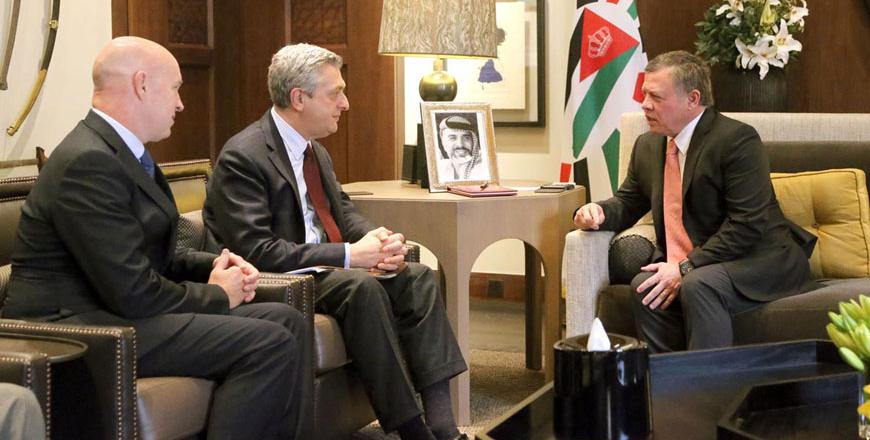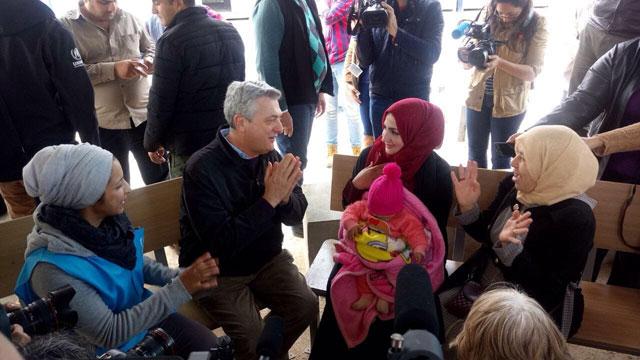You are here
Jordan has fulfilled responsibilities to refugees — Grandi
By Khetam Malkawi - Oct 23,2016 - Last updated at Oct 23,2016
AMMAN — Jordan has fulfilled its responsibilities in hosting Syrian refugees, and other countries must step up to that, a senior UN official said on Sunday.
The issue of Syrian refugees is currently the most urgent crisis, “partly because the politics around the peace process do not seem to be progressing in the direction we would like them to”, said UNHCR High Commissioner Filippo Grandi.
The solution to the refugee crisis is peace in Syria, so people can return peacefully and voluntarily to their homes, he said.
“Since that will take time to happen, we will continue to support Jordan,” he added at a joint press conference with Deputy Prime Minister and Foreign Minister Nasser Judeh.
Grandi started his second visit to Jordan on Saturday as part of a broader mission to the region, and met with Judeh on Sunday to discuss the Syrian refugee crisis and its impact on Jordan as a host country.
At a press conference following the meeting, Judeh said that the Syrian crisis is not the responsibility of Syria’s neighbours alone, stressing that it is an international crisis and that the world must shoulder its responsibilities towards the displaced Syrians.
Speaking of the support that Jordan is receiving, Grandi said the London donor conference in February was a turning point, although he acknowledged that its outcomes would take some time to be realised.
“The London conference was a new approach to supporting host countries in particular, including Jordan and Lebanon, involving new financial instruments that were never used before in humanitarian crises,” Grandi said, adding that aid pledged in the conference takes longer to be delivered than other forms of assistance aid, which are quicker but modest and unable to fulfil some of the long-term needs, including education and jobs.
“I always say that the London conference came five years late, but it was good,” he stressed.
So far, the Kingdom has received 35 per cent of what is needed to fully provide services to Syrian refugees in the country. Jordan hosts some 1.3 million Syrians, only about half of whom are registered as refugees.
The berm
As for the Syrians stranded in the no-man’s land between the Jordanian and Syrian borders, known as the berm, both Grandi and Judeh stressed that no one is pressuring Jordan to allow them to enter the Kingdom.
Jordan declared the northern and northeastern border areas a closed military zone in June in the aftermath of a terrorist attack that targeted a military post serving refugees near the border, killing seven troops and injuring 13 others.
Since then, Jordan has agreed with international relief agencies to allow a one-off aid delivery to the area in August, while global stakeholders were expected to seek alternative solutions to continue the mission.
The UN official said plans adopted by the government ensure a balance between the humanitarian imperative to give assistance to those in the berm and to fully respect the Kingdom’s security concerns.
“Nobody wants Jordan to be destabilised. It has already paid a price in human lives in terms of security and this must not happen again,” Grandi said.
“My role is to tell the international community: Do not put more assistance to prepare for a disaster in Mosul at the expense of Aleppo or the expense of what is being done in Jordan,” Grandi noted. “This is what I constantly do.”
Meeting the needs of IDPs in Mosul
Speaking about the current offensive against the Daesh terror group in Iraq’s Mosul and the expected displacement, the official said most Mosul residents will be displaced within Iraq, while very small numbers will cross to Syria. “There are lots of preparations in all areas — shelters, water, medicine, food. The big challenge that we are addressing slowly is sites to put people,” he said.
The task is difficult as Iraq already has more than 3 million displaced people and they occupy a lot of areas, including parts of the land under the jurisdiction of the Kurdish Regional Government.
“There are some complexities there, but we had some progress both in Baghdad and in Erbil”, he added.
Equipment and supplies are ready, and progress has been made in site preparations, said Grandi, noting that a few thousand people had been taken to a site near Mosul.
If huge numbers of people flee the Iraqi city, this will be a big challenge whose magnitude would depend on how the offensive develops, he said.
Related Articles
AMMAN — Jordan will accelerate the security screening process for 20,000 Syrian refugees in Azraq camp who entered from the no-man's-land ne
AMMAN — His Majesty King Abdullah on Monday called for further cooperation between the Kingdom and UNHCR, to ensure that the international c
ZAATARI REFUGEE CAMP — The United Nations High Commissioner for Refugees (UNHCR) Filippo Grandi on Sunday said that there has not been any d


















